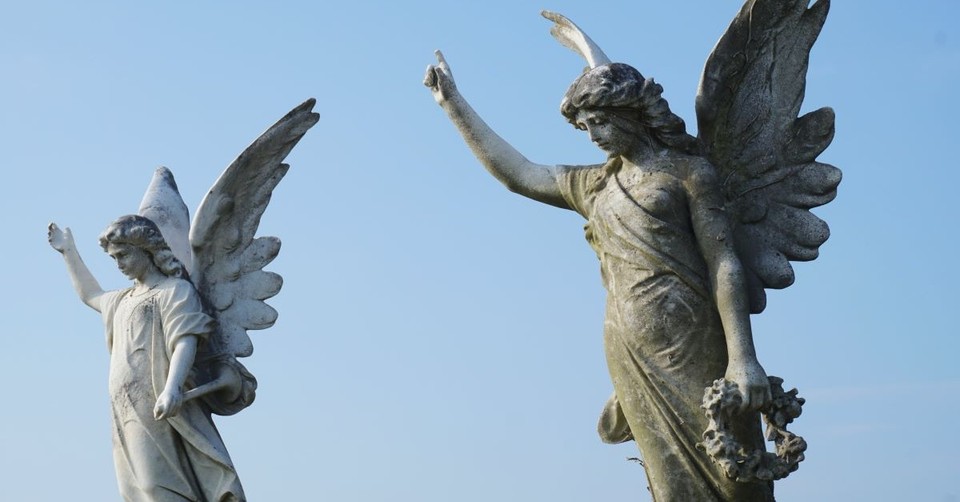Are There Different Types of Angels?

Angels serve God and humanity in a variety of important ways. From celebrating worship in heaven to responding to people’s prayers on earth, angels are constantly working on diverse assignments from God. Are there different types of angels to carry out so many different tasks? Indeed, there are different types of angels, and here’s a look at what the various types of angels do.
What Does the Bible Tell Us about Angels?
God created angels before he created humans, the Bible tells us. In Job 38:7, God says that “all the angels shouted for joy” when he created our planet. Angels are spiritual beings who worship God in heaven (Revelation 4:8, Hebrews 1:6) and whom God sends to Earth to “serve those who will inherit salvation” (Hebrews 1:14). While angels don’t have physical bodies like humans do, angels can appear on Earth in different ways, including as light, with wings, and in forms that look human. In fact, the Bible even says that sometimes angels have shown up looking like people and not been recognized for who they really are: “Do not forget to show hospitality to strangers, for by so doing some people have shown hospitality to angels without knowing it” Hebrews 13:2 says. Angels are so numerous that the Bible uses incalculable language to describe their vast numbers. Hebrews 12:22, for instance, describes “thousands upon thousands of angels in joyful assembly.”
All angels deliver messages of some kind in the work they do. The English word “angel” is a translation of the Greek word “angelos,” which means “messenger.” God has entrusted angels with delivering the most spiritually important messages in history – from announcing the birth of Jesus Christ in Bethlehem on the first Christmas, to proclaiming Jesus’ resurrection on the first Easter. God may send angels on assignment to us, to deliver messages of encouragement, guidance, warning, comfort, or inspiration.
Different Types of Angels, Both Holy and Fallen
Angels are diverse! The Bible mentions these different types of angels:
Archangels: These angel leaders lead teams of angels working on specific types of God-given assignments. While the Bible only specifically mentions one angel – Michael – as an archangel (Jude 1:9), Christian tradition and apocryphal Christian scriptures identify several other angels as archangels: Gabriel, Raphael, and Uriel. Michael leads the holy angels in battles for good to win over evil. Gabriel communicates important messages, such as telling the Virgin Mary that God has chosen her to serve as Jesus’ mother on Earth (Luke 1:26-39). Raphael focuses on healing ministry. Uriel helps people pursue wisdom through relationships with God.
Guardian angels: The closest angels to humans are the guardian angels that help guard us during our earthly lifetimes. In Matthew 18:10, Jesus refers to guardian angels that God has assigned to every child. Psalm 91:11 mentions guardian angels for adults, revealing that for each person, God “… will command his angels concerning you to guard you in all your ways.” Our guardian angels are constantly caring for us, following God’s instructions for how to do so well. Their jobs include praying for us, delivering messages from God to us, and rescuing us from danger in situations where our lives are at stake and it’s not yet our time to pass away.
Other types of holy angels: The Bible also mentions other types of angels. These include seraphim angels who worship God in heaven (described in Isaiah chapter 6); cherubim angels who guard what is holy (in the book of Genesis, cherubim appear in the Garden of Eden, and in the book of Exodus, God directs that cherubim likenesses should be featured on the Ark of the Covenant, etc.); and thrones, dominions, principalities, and powers (who are all mentioned in Colossians 1:16, and who work on various assignments from God to help people on Earth).
Fallen angels: The Bible also tells us that some angels have fallen from the glorious way that God had originally designed them to be. While most angels remained holy and faithful to God (Revelation 5:11-12), some angels became corrupted by sin after participating in a rebellion led by one angel. That angel, known as Lucifer before the angelic fall and as Satan afterward, fell from heaven after trying to take God’s power for himself (Isaiah 14:12-14). Fallen angels, who are also known as demons, are dangerous. They can lie, tempt us to sin, and harm us spiritually, mentally, emotionally, and physically. Thankfully, when we’re connected to Jesus in saving relationships, we have the power to overcome any type of evil – including influences from fallen angels. Romans 12:21 assures us that, through relationships with Jesus, we can “overcome evil with good.”
What Do We Need to Know about Holy and Fallen Angels?
It’s important to know that we can count on God to send us help from angels. In my book Wake Up to Wonder, I share a story about meeting an angel while hiking in the Grand Canyon. Hiking uphill, I hoped to get out of the canyon before dark. I was so tired and dehydrated, however, that I stumbled and nearly fell into the canyon. Shortly after I asked God to help me, I encountered a tall human man, whose voice and words appeared angelic in nature. After meeting him, I experienced a burst of energy and strength that propelled me to safety at the top of the canyon. God may send his angels to help us anytime and anywhere. When asking for angelic help, though, we should go directly to God with our requests rather than praying to angels. Prayer is an act of worship, and just as holy angels worship only God, so should we. Revelation 22:8-9 describes how the apostle John tried to worship an angel in gratitude for the visions that the angel had shown him. The angel told John in verse 9, “Don’t do that! I am a fellow servant with you and with your fellow prophets and with all who keep the words of this scroll. Worship God!”
We also should be alert to how God may use his messengers, the holy angels, to send us messages. He can communicate messages to us whether we’re awake or asleep, through our dreams. It’s important to be open to those messages. But it’s also important to process any messages we receive by evaluating them with wise discernment. 2 Corinthians 2:15 warns us that fallen angels “masquerade as servants of righteousness.” Fallen angels may claim to be representing God, but in reality are acting as false prophets. In Jeremiah 23:16, God cautions that false prophets “speak visions from their own minds, not from the mouth of the Lord.” When considering an angelic message, we can exercise spiritual discernment by testing them, according to 1 John 4:1: “Dear friends, do not believe every spirit, but test the spirits to see whether they are from God because many false prophets have gone out into the world.” We can test the angels by following the advice in 1 John 4:2: “This is how you can recognize the Spirit of God: Every spirit that acknowledges that Jesus Christ has come in the flesh is from God.”
Ultimately, we should turn our attention away from fallen angels and think of holy angels as God’s helpers and our fellow creatures. Only God is omniscient (all-knowing) and all-powerful (omnipotent). God alone – not angels – has the power to perform miracles (Psalm 72:18). The glory of God’s holy angels can inspire us to praise God for the wonders of his creation.
Conclusion
God has created many different angels who spread his love through their faithful service. Learning about these different types of angels can strengthen our faith by reminding us of the vast spiritual support network around us. The countless holy angels who serve as messengers of God are always ready to act whenever God gives them their next assignment. That’s something to celebrate!
Photo Credit: Unsplash/Gavin Allanwood

Originally published March 31, 2022.





